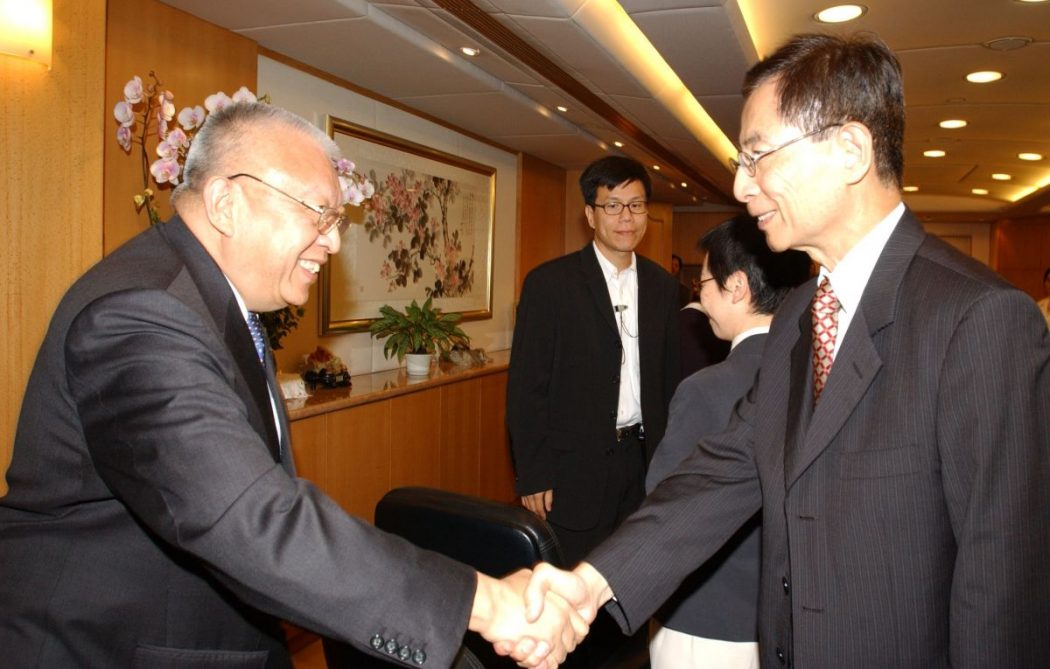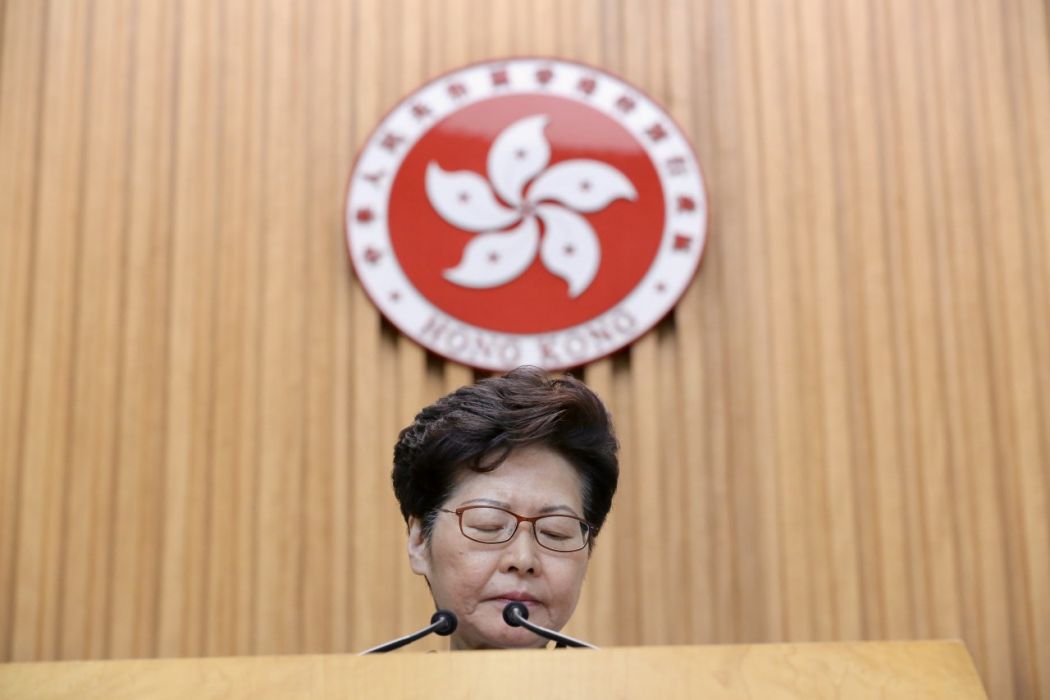In the 1980s, when it became known that China would regain sovereignty over Hong Kong in 1997, there were jitters across the Hong Kong community. Tens of thousands of residents emigrated and business confidence wavered.
To stem the outflow of talent and capital, Britain and China in 1984 signed the Sino-British Joint Declaration, which promised Hong Kong “a high degree of autonomy” for at least 50 years after China resumed control.

“At the time Beijing was worried that people would all leave. To win their hearts, it (promised to allow) Hong Kong people to rule Hong Kong and to have a high degree of autonomy,” reminisced Martin Lee, the founding chairman of the Democratic Party and senior counsel, in an interview before his arrest on Saturday.
When Lee, one of 23 Hongkongers to serve on the 59-member Basic Law Drafting Committee, attended the first meeting in July 1985 in Beijing, there was widespread hope that China would change for the better. Having emerged from the tumultuous Cultural Revolution in 1976, the country was in the midst of the reform and opening era as economic and political liberalisation got underway.

In stark contrast with the current strained Hong Kong-China relationship, there was a high level of trust between Hong Kong and China at the time. Lee described his time drafting the Basic Law from 1985 to 1989 as a “very happy” time, until he quit in protest following Beijing’s 1989 crackdown on the Tiananmen pro-democracy movement.
“There was mutual trust at the time – Hong Kong people trusted the Chinese government,” said 81-year-old Lee. “We hoped they would abide by this international agreement. We put all our hopes in the Basic Law and hoped it would safeguard everything over the next 50 years.”

The mood has darkened in the two decades since Hong Kong returned to Chinese rule, as conflicts between Hong Kong and the mainland intensified. Over the years, China has tightened its control over the city, particularly after the 2003 protest against the Article 23 subversion law and again after the 2014 pro-democracy Umbrella Movement.
The erosion of political rights, the rule of law and a range of basic civil liberties culminated in widespread discontent. Anger over an extradition bill last year exploded into months-long anti-government protests.
Things took a dramatic turn over the past week. Lee was one of the 15 prominent pro-democracy figures arrested by police on Saturday on charges of illegal assembly for their involvement in unapproved protests last year. The arrests took place just hours after China’s Liaison Office declared it is not bound by the Basic Law, which bars the Chinese government from interfering in local affairs. Earlier in the week, Liaison Office’s chief, Luo Huining, called for national security legislation to be urgently passed amid accusations of overreach by Beijing into the city’s legislative council and judiciary.

Lee said one of the biggest blows to the Basic Law came in June, 2014 on the 30th anniversary of the Joint Declaration, when a Beijing policy white paper asserted that the Chinese government had “comprehensive jurisdiction” over Hong Kong and the city’s “high degree of autonomy… comes solely from the authorisation by the central leadership.”
“This was totally different from what they said before,” Lee said. “They were now saying very clearly that the Party would rule Hong Kong, not Hong Kong people ruling Hong Kong. So we have to do whatever they tell us. This has completely broken their promise.”
Basic Law articles 45 and 68 state that the Chief Executive and members of the Legislative Council should be elected through universal suffrage and article 22 says the mainland government cannot interfere in affairs in Hong Kong.
China rejected the election of the chief executive and legislators by universal suffrage in 2007 and 2008. In August 2014, the National People’s Congress Standing Committee ruled that Hong Kong voters could only elect its top leader by “universal suffrage” from two or three candidates endorsed by the majority of a 1,200-strong largely pro-Beijing nominating committee.

Lee sees the landmark ruling as a violation of the two elements most crucial for the success of the “one country two systems” policy: universal suffrage and prohibiting Chinese government interference in Hong Kong affairs.
“‘One country two systems’ has not materialised even for one day. They said all along that Hongkongers would be their own masters so why won’t they give people rights to elect?” he said.
“The Communist Party is fully in charge
MARTIN LEE
and they give however much freedom
they want to give and can take it
away any time they like…
“The Chief Executive is handpicked by China, and the pro-government lawmakers rely on Beijing for their votes … they are all obedient to the Communist Party, the seesaw is not balanced,” he said.
The Chief Executive often echoes the rhetoric of her Beijing masters. This week, after the mainland’s Hong Kong and Macau Affairs Office accused some pro-democracy lawmakers of misconduct in public office for delaying bills in the legislature by filibustering, Carrie Lam stressed that Hong Kong is under the direct control of the Chinese government as a Special Administrative Region and said “a high degree of autonomy” doesn’t mean the “central government has given up its power and authority on Hong Kong affairs”. She rejected claims that Beijing has interfered in local affairs.

China’s Liaison Office in Hong Kong declared on Friday that it is not subject to Basic Law restrictions in article 22 that bar central government departments from interfering in local affairs – insisting it has the right to comment on Hong Kong matters.
On Wednesday, after Beijing’s top official in Hong Kong Luo Huining said national security legislation should be urgently enacted, Lam said illegal protests, hate speech and “extremist acts close to terrorism” in the months-long anti-government movement “may escalate to a level which threatens national security” if not curbed.
Lee said the political imbalance has only exacerbated Hong Kong’s woes. “The Communist Party is fully in charge and they give however much freedom they want to give and can take it away any time they like,” Lee said. “They want a goose that lays the golden eggs but they can’t tolerate it if the goose doesn’t obey them.”
“This is not a long term solution.”
China’s refusal to grant democracy has set off large-scale resistance movements. The National People’s Congress Standing Committee’s denial of an unfettered vote in 2014 sparked the 79-day Umbrella Movement. Last June, triggered by a controversial anti-extradition bill which could have seen individuals sent to China for trial, the simmering anger and frustration exploded into Hong Kong’s most severe political crisis since the handover.

Did Lee foresee while drafting the Basic Law in the 80s that the Communist Party – with its authoritarian history – would refuse to grant genuine democracy to Hong Kong and frustrations would snowball into the current political crisis?
Lee said the Basic Law was created precisely to address that uncertainty, knowing that the “one country two systems” policy would be difficult to implement. “It was a solution where there was no solution,” said Lee.
“We hoped it wouldn’t come to this. You can’t say I believe the Communist Party and things would be okay. That’s why we had to put these [guarantees] in legal language in the Basic Law,” he said.
“It’s not the fault of the Basic Law that [China] doesn’t keep its promises and the UK turns a blind eye,” Lee said.
A Chinese foreign ministry spokesman said in 2017, on the eve of the 20th anniversary of the handover, that the Joint Declaration was a historical document that no longer had “any practical significance” and the UK had “no sovereignty, no power to rule and no power to supervise Hong Kong after the handover.” The Foreign Office in the UK said it remained valid.
“It’s very upsetting, and the saddest part is that China is such a big country – how can you renege on your promises, telling the whole world that the Chinese government, the world’s second largest economy, is not to be trusted?”

Lee said he understood and sympathised with Hong Kong’s young people: “If I were young, I’d be on the frontline too.” But he urged them to refrain from resorting to violence to let out their frustrations. Over 7,800 have been arrested during the months-long protest movement with police firing live rounds, tear gas, rubber bullets and using severe beatings to deal with protesters. Some retaliated with Molotov cocktails, setting fire to objects and wrecking shops seen as pro-China.
“Violence is not a solution. Foreign countries can only support us when there is no violence,” he said, stressing that the international community has a duty towards upholding the Basic Law as the Joint Declaration was a legally-binding treaty registered with the United Nations.
“There are so many arrests and jailings, maybe many see it as heroic… but it only works when your sacrifice is worth it,” Lee said.
After he was released on bail on Saturday, Lee told reporters that he felt “relieved” and had “no regrets”. “After months of witnessing youths being arrested and prosecuted while I stayed out of it, I actually felt guilty… I feel proud to walk the road of democracy with these outstanding youths in Hong Kong.”
In his interview with HKFP, Lee urged young people to put their hopes in the Legco election in September and endeavour to fight for the “best results” to rebalance the seesaw of power.
“That would be a legal way to fight with them,” he said, stressing that widespread disappointment in the government may alter the outcome of the election of lawmakers in the functional constituencies in Legco, traditionally dominated by pro-establishment figures.
If pro-democracy candidates win a majority in the functional constituencies, it would dramatically alter the power distribution at Legco, of which only half of the 70 seats are directly elected, while the other 35 seats in the functional constituencies are occupied by mostly pro-establishment figures from corporate and special interest groups. Such a scenario would block the government from passing unpopular bills such as the looming Article 23 legislation, which China insists must be enacted to safeguard national security.
Analysts say the arrests of prominent pro-democracy figures was likely to be a political maneuver to intimidate the democrats and to ram through the national security legislation before the Legco election.

Today, Lee’s name is nowhere to be seen in official documents that celebrate the Basic Law. He was not invited to an online seminar organised by Beijing to mark the 30th anniversary of the promulgation of the Basic Law. There was no mention of him in a Hong Kong government promotional video which featured only pro-government figures.
Still, Lee said the fight for democracy must go on.
“We’re trapped in a bird cage but we must continue to fight,” he said. “We must persist, for as long as we can.”
Additional reporting: Clara Bunting.
Correction 21/4: A previous version of this piece stated that the Basic Law, as opposed to the Joint Declaration, was a legally-binding treaty registered with the UN. We regret the error.


